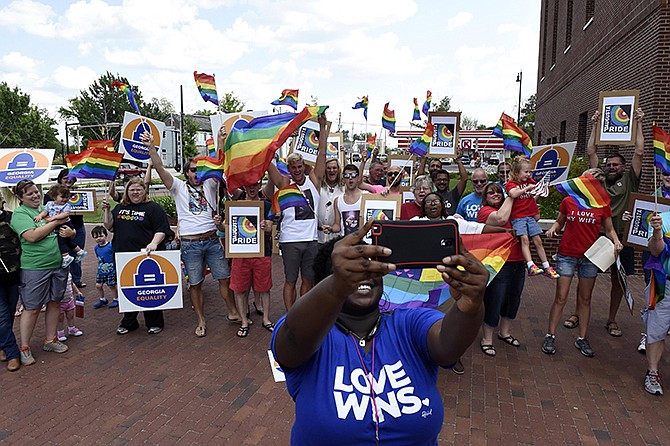SALT LAKE CITY (AP) - The decades-long debate about whether same-sex marriage should be allowed in the United States was finally settled Friday when the U.S. Supreme Court ruled gay and lesbian couples can get married anywhere in the country.
A closer look at what it means:
IS THIS THE FINAL WORD ON THE ISSUE?
Yes, for all intents and purposes. The states that oppose gay marriage could ask the justices to reconsider, but that's unlikely. That means June 26, 2015, will be marked in future history books as the moment gay marriage was declared legal across the United States.
WHAT DOES THIS MEAN FOR THE 14 STATES THAT STILL BAN GAY MARRIAGE?
The Southern and Midwestern states must lift their bans and allow gay and lesbian couples to marry. Marriage licenses were already being issued Friday in many of these states. The court gave the losing side roughly three weeks to ask for reconsideration, but some state officials and county clerks are opting to go ahead and begin issuing marriage licenses to same-sex couples. The 14 states that had banned gay marriage are Georgia, Ohio, Texas, Arkansas, Michigan, Nebraska, Alabama, Kentucky, Louisiana, Mississippi, most of Missouri, North Dakota, South Dakota and Tennessee.
DOES THIS MEAN CHURCHES MUST
CONDUCT GAY MARRIAGES?
No. Religious organizations are exempt from this ruling. They can still make their own decisions about whether clergy will conduct gay marriages in their places of worship. Southern Baptists, Mormons and other conservative churches that believe God intended marriage to be a union only between a man and a woman said the ruling won't change their decisions not to allow same-sex marriages in their churches. Some religions already allow gay marriage, such as the United Church of Christ, and more could follow. Episcopalians are set to decide next week at an assembly in Salt Lake City whether to change church laws so religious weddings can be performed for same-sex couples.
WILL GAY AND LESBIAN COUPLES GET
THE SAME BENEFITS THAT OPPOSITE-SEX MARRIED COUPLES RECEIVE?
They should, but there may be hiccups as states come to grips with this new reality. Being able to get Social Security benefits, file taxes jointly and get divorced should be easy to implement, but gay and lesbian couples will likely find a bumpy road in being granted outright parentage of their children, said Douglas NeJaime, faculty director of the Williams Institute at the UCLA School of Law. Most states grant automatic parental rights to the biological birth mother and father. For a lesbian couple, only one person fits that mold. For gay men, neither does. Iowa refused to grant automatic parental rights until the state Supreme Court ordered Iowa to do so in 2013. In Utah, a lesbian couple has sued the state after they were not allowed to put both of their names on their new baby's birth certificate. NeJaime predicts the states that resisted making gay marriage legal will also push back on this front.
WERE THE JUSTICES UNANIMOUS
IN THEIR DECISION?
No. The ruling narrowly passed 5-4. Justice Anthony Kennedy wrote the majority opinion, joined by the court's four more liberal justices, saying the stories of the people asking for the right to marry "reveal that they seek not to denigrate marriage but rather to live their lives, or honor their spouses' memory, joined by its bond." The four dissenting justices each filed a separate opinion explaining his views, but they all agreed that states and their voters should have been left with the power to decide who can marry. "This court is not a legislature. Whether same-sex marriage is a good idea should be of no concern to us," Chief Justice John Roberts wrote.
HOW MANY SAME-SEX COUPLES
ARE ALREADY MARRIED?
There are an estimated 390,000 married same-sex couples in the United States, according to the Williams Institute, which tracks the demographics of gay and lesbian Americans. Another 70,000 couples living in states that do not currently permit them to wed would get married in the next three years, the institute says. Roughly 1 million same-sex couples, married and unmarried, live together in the United States, the institute says.
HOW DID CONSERVATIVE GROUPS THAT OPPPOSE GAY MARRIAGE REACT TO THE RULING?
With frustration. The Sutherland Institute in Utah said the decision shows a growing opinion among government and "other elites" that adult interests are more important than the well-being of children, who they believe are much better off raised by opposite-sex couples. Another Utah group called the Eagle Forum declared in a statement that the justices "voted today to destroy our American culture."

